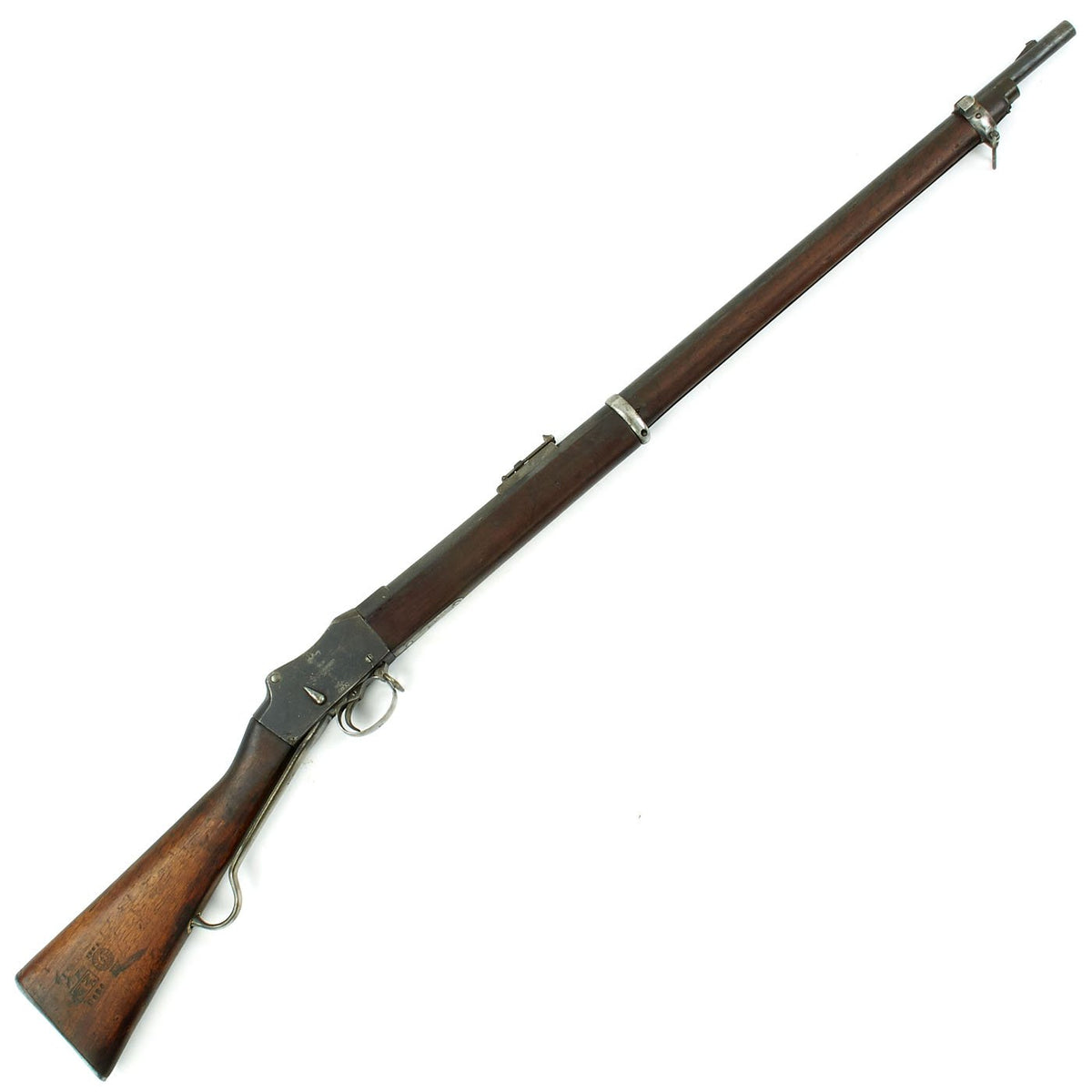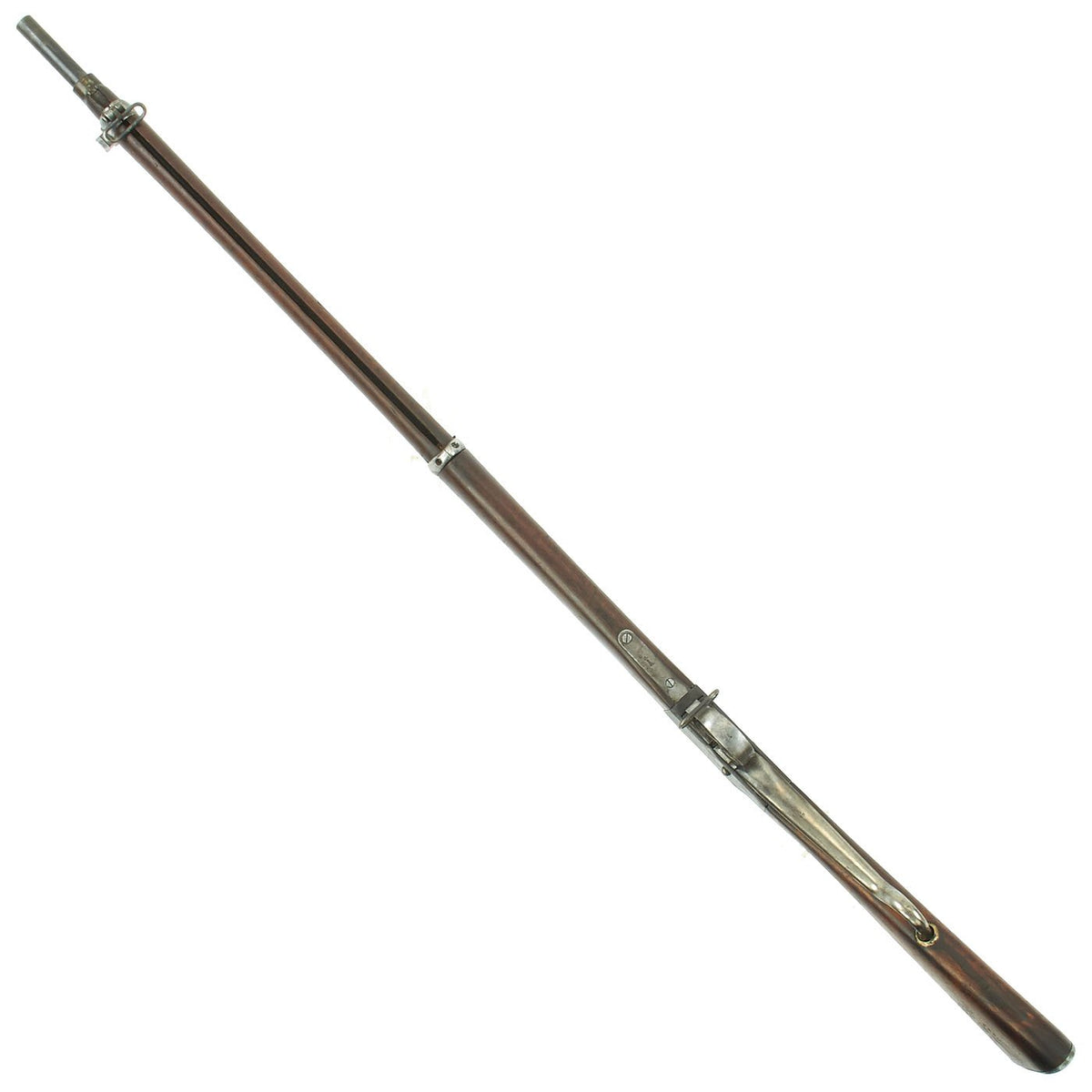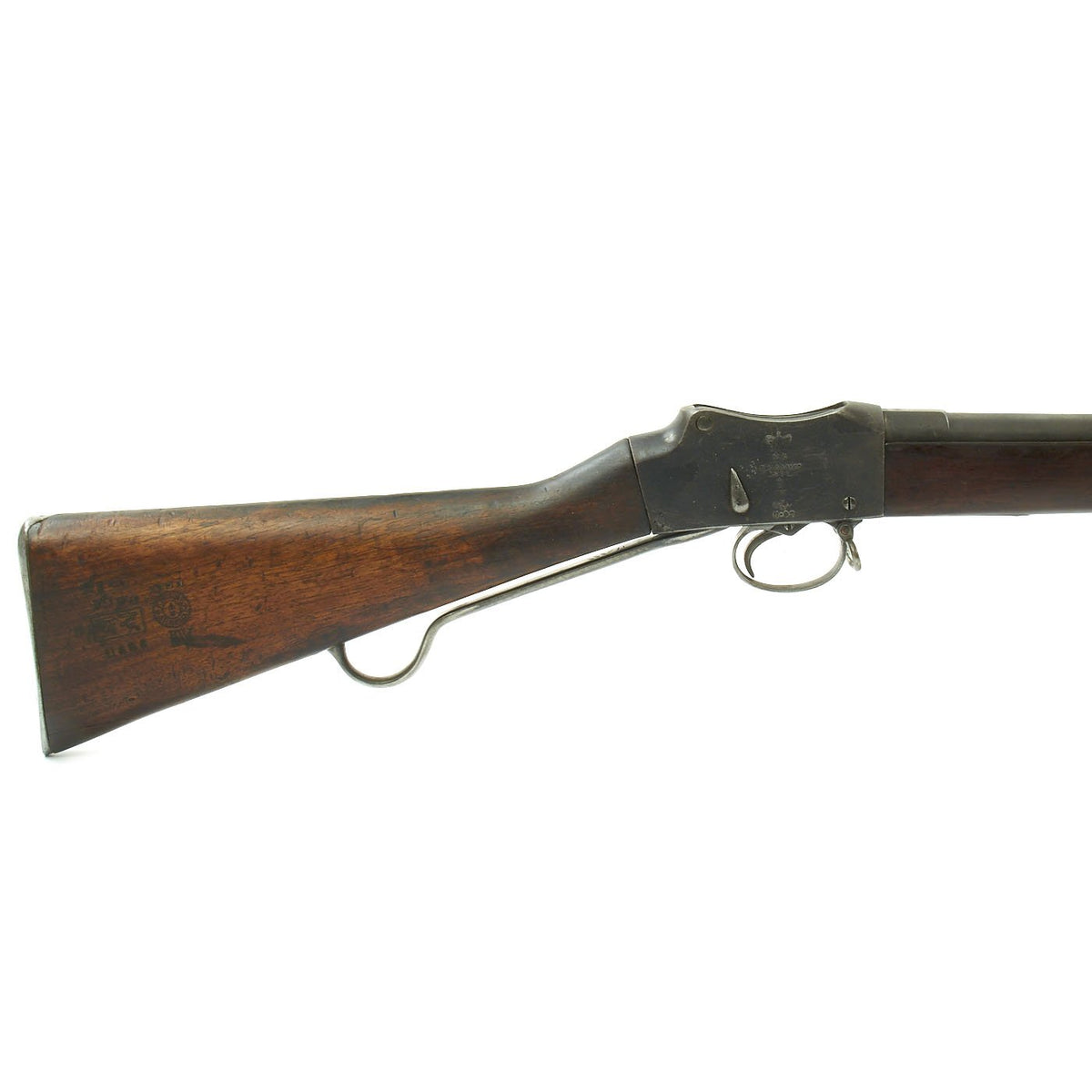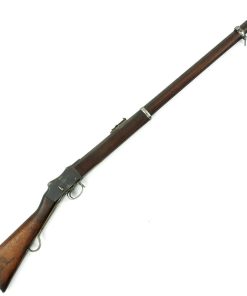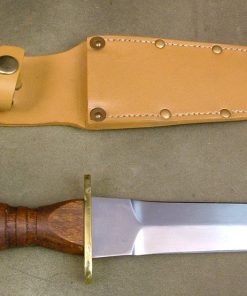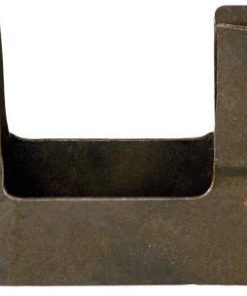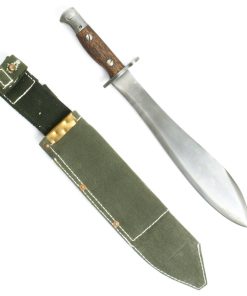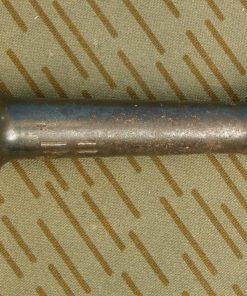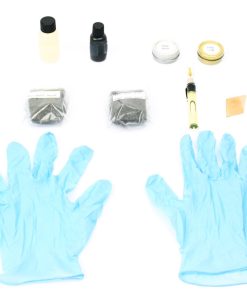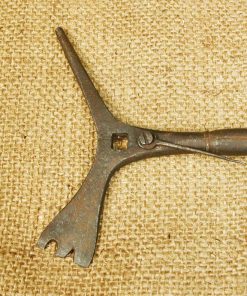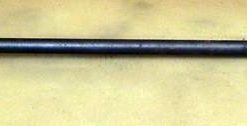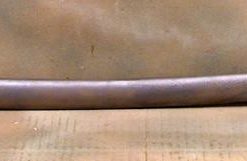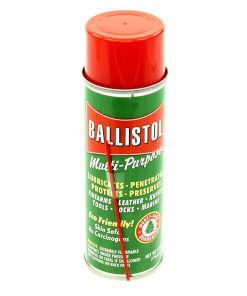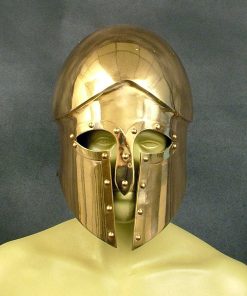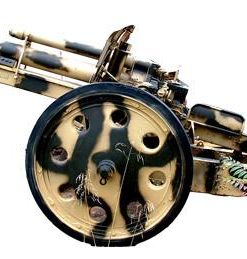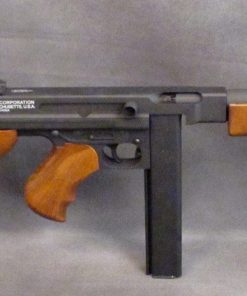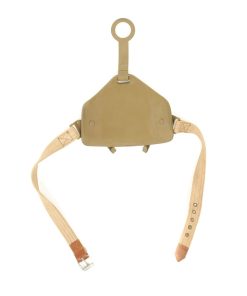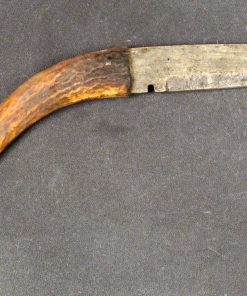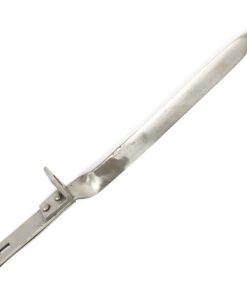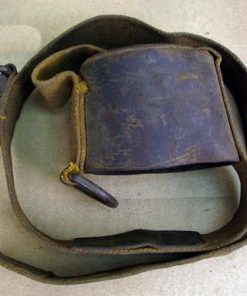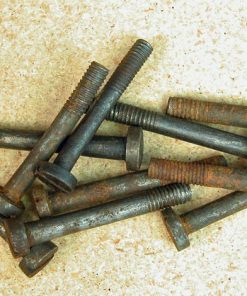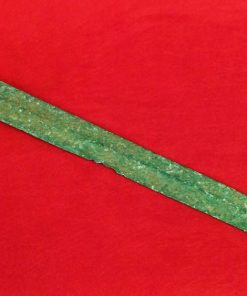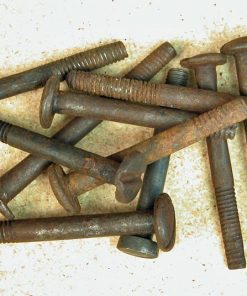Original British P-1885 Martini-Henry Pattern B MkIV Rifle by B.S.A.&M. Co. dated 1895 – Kirkee Arsenal Marked Original Items
$ 1.095,00 $ 273,75
Original Item: Only One Available. Part of our exclusive discovery of antique firearms in the royal palace of Nepal. The great success of the P-1871 Martini Henry Short Lever Rifle had only been marred by the occasional difficulty experienced with the ejection of the spent cartridge from powder residue fouling the chamber.
The solution was the introduction of the P-1885 “long lever” model that provided great leverage for case extraction. In front line service for only three years when it was superseded by the .303 cal P-1888 magazine Rifle the P-1885 Martini saw principal use in Britain’s overseas colonial empire.
Officially, production of the Mark IV stopped in 1889, but as part of the Nepalese cache, several Martini Mark IV Pattern B rifles have been found with 1895 dates. Also, instead of being made by R.S.A.F. Enfield, they bear the marking for “Birmingham Small Arms & Metal Company,” such as this example does on the right receiver:
(CROWN)
V.R.
B.S.A&M.Co
1895
(Viewed Mark)
IV
Below this are the “Opposed Cross Arrows” for being sold out of service, as well as KK A / 11 . 08, for Kirkee Arsenal, November 1908. There is also a butt stock rondel indicating the same information:
1908
KIRKEE
(Broad Arrow)
ARSENAL
There has been some discussion over the exact meaning of the markings on the receiver, as well as the origin of the parts. R.S.A.F. Enfield was the only factory that produced the Mark IV rifle, officially. However after production ended, B.S.A.M&Co. was contracted in 1894 to produce spare parts for Martini-Henry rifles in service in India, and this included Action Bodies / Receivers for the Artillery Carbine, as well as Mk II, III, and IV long rifles.
So, was this rifle assembled at Kirkee Arsenal from parts on hand? Was a replacement Action body used with an existing rifle that had been damaged? The history is not entirely clear, but there are loads of proof marks on the rifle, including under the stock, so perhaps the ambitious collector can examine them.
This example is in very nice condition, as the pictures show. The action cycles and dry fires, and the bore shows clear rifling, with a mostly bright finish. The only issue is that unfortunately the cleaning rod on this example is missing.
An interesting example of a very late production Mark IV Pattern B Martini-Henry rifle. Ready to research and display!
Below copy is courtesy of martinihenry-
With the decision to make general issue of the Martini Henry MKII & MkIII to the militia and Volunteers in January 1885 and the impending new .303″ caliber and the suspension and ultimate cancellation of the .402″ bore Enfield Martini in June 1887, it was decided as a short term measure to convert those 65000 .402″ Enfield Martinis already made into a useable .577/450″ arm. The new rifle was to be designated the Martini Henry MkIV at a cost to convert those arms was expected to be 6s 6d per piece.
The success of enhanced extraction of the longer lever of the Enfield Martini Pattern B rifle was readily adopted for all MkIV patterns, those existing Enfield Martini A pattern walnut stocks required the brass stock cup re-sitting to correspond with the long levers’ tip. The process required a fresh recess hole to be drilled and the cup re-set. A purpose made wooden plug was glued into the hole completing the process. As the stocks were all removed there is no consistency as which stock was fitted to A or B pattern, so they will be found on any pattern. Wherever possible the old components were re-used, and the “E-M” designation originally marked on many of the parts betrays today its original pedigree often scored through thus: E-M . The A pattern trigger assembly, designed to accept the E-M’s safety was reamed to remove the original configuration, whilst Receivers and butt stocks of the old pattern had an extra Roman numeral “V” stamped alongside the original “I”, whilst newly made but un-used components have a distinctive “IV” classification. A new pattern clearing rod, designed to spring into place and to be suitable with use of the new steel jag was installed and the nosecap was redesigned, however it was decided to retain to old pattern Barleycorn on Block foresight on the pattern “A”.
Martini Henry MkIV pattern B & C
The Enfields’ records throw into confusion as to what happened to the 49,902 Pattern B .402″ arms manufactured, these rifles required less conversion, the obvious re-bore to .577/450 calibre, and apart from sighting alteration and re-tooling of the extractor it was a far easier task to convert. These existing Pattern B rifles after barrel conversion to the new .577/450 were designated as the Martini Henry MkIV Pattern “C”, or “conversions”, whilst those rifles made as new pieces, from new components which were rifled to .577/.450″ were known as Martini Henry Pattern “B”,
The author begs to be controversial and also doubts conventional thinking on the issue, In my collection I have a Martini Henry pattern B, with a “B”designation to the serial number, several B markings on the knocks form, and B on the receiver, I have inspected 15 other examples and found the same, all proof marks are single line, not a twin line of proofs clearly, a discrepancy, or maybe proof indeed of the original nomenclature, however to confuse matters, the official List of change No 5603, announcing the issue of the MH MkIV clearly states the knocks form of pattern A & B are 1/8th inch shorter than the pattern C, which ever, the new sealed patterns were offered for adoption and accepted on the same date 15th Sept 1887
In 1895 BSA & M Co was contracted to refurbish 5000 Martini Henry MkIV, it is to be noted these rifles carry the BSA & M Co logo, however these rifles have Enfield made barrels, and therefore are not BSA original pieces.
Specifications-
Year of Manufacture: 1895
Caliber: .577/450 Martini-Henry
Barrel Length: 33 inches
Overall Length: 49 Inches
Action type: Lever Action Falling Block
Feed System: Single Shot
NOTE: International orders of antique firearms MUST be shipped using UPS WW Services (courier). USPS Priority Mail international will not accept these.
Fast Shipping with Professional Packaging
Thanks to our longstanding association with UPS FedEx DHL, and other major international carriers, we are able to provide a range of shipping options. Our warehouse staff is expertly trained and will wrap your products according to our exact and precise specifications. Prior to shipping, your goods will be thoroughly examined and securely secured. We ship to thousands clients each day across multiple countries. This shows how we're dedicated to be the largest retailer on the internet. Warehouses and distribution centres can be located throughout Europe as well as the USA.
Note: Orders with more than one item will be assigned a processing date depending on the item.
Before shipping before shipping, we'll conduct a thorough inspection of the items you have ordered. Today, the majority of orders will be delivered within 48 hours. The delivery time will be between 3-7 days.
Returns
The stock is dynamic and we cannot completely manage it because multiple stakeholders are involved, including our factory and warehouse. So the actual stock may alter at any time. It's possible that you may not receive your order once the order has been made.
Our policy is valid for a period of 30 days. If you don't receive the product within 30 days, we are not able to issue a refund or an exchange.
You can only return an item if it is unused and in the same state as the day you received it. You must have the item in its original packaging.
Related products
Uncategorized
Uncategorized
Uncategorized
Uncategorized
Uncategorized
Armoured Fighting Vehicles of the World: AFVs of World War One (Hardcover Book) New Made Items
Uncategorized
Uncategorized
Uncategorized
Uncategorized
Angolan Rebel 1970s era 60mm Inert Display Mortar from Angolan Civil War Original Items
Uncategorized
Band of Brothers ORIGINAL GERMAN WWII Le. F.H. 18 10.5cm ARTILLERY PIECE Original Items
Uncategorized
Uncategorized
Uncategorized
Uncategorized
Uncategorized
Uncategorized
Uncategorized
Uncategorized
Uncategorized
Uncategorized
